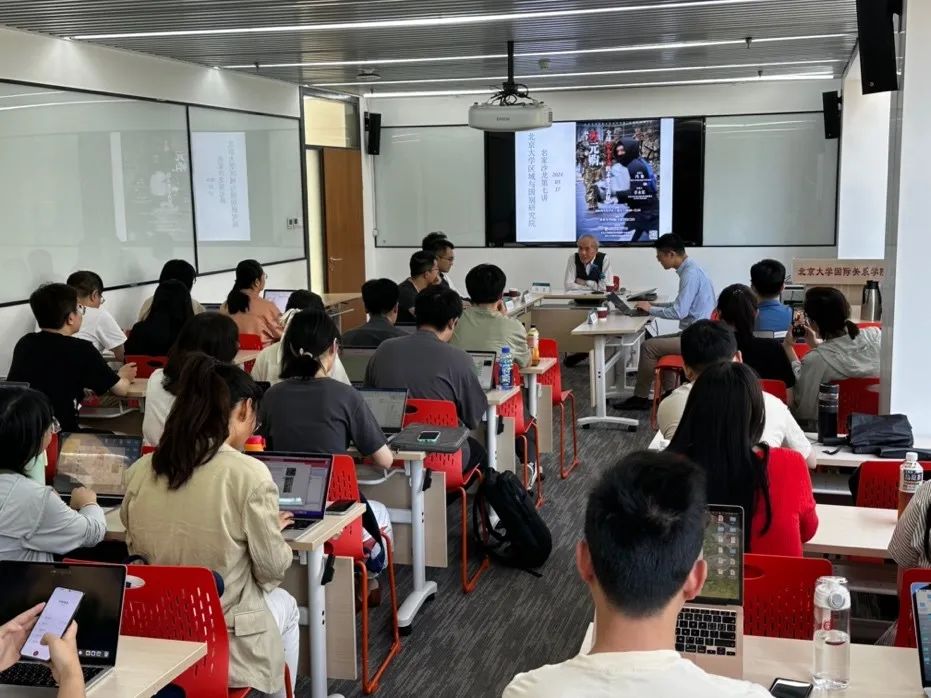
The 7th lecture in the “Master Salon” series of Peking University’s Institute of Area Studies (PKUIAS), titled “‘Zero-dollar shopping’: The representation of the future of global capitalism”, was held on May 17. This lecture was delivered by Feng Xiang, a professor at Tsinghua University, and moderated by Zhang Yongle, deputy director of PKUIAS. Zhang Jiajun, an assistant research fellow at the Institute of American Studies, Chinese Academy of Social Sciences; Xie Kankan and Yang Meng, both assistant professors at the School of Foreign Languages, PKU; and Chen Xiaohang, a post-doctoral fellow at the School of Law, PKU, participated in the event.
Feng Xiang took the phenomenon of “zero-dollar shopping” in the US as a starting point to discuss the evolution of economic and social relations in that country. “Zero-dollar shopping” is essentially tolerated in the US, and what’s special is that it breaks the tenets of all bourgeois legal myths. This phenomenon resulted from the trend of pluralism in the U.S. since the 70s and 80s, reflecting the profound changes in race relations in the U.S. and signaling that capitalism is trapped in crisis.
Per Feng Xiang, there are two main causes of the crisis facing capitalism: first, the development of science and technology, namely, the contradiction between the productive forces that have developed to a certain extent and the incompatible relations of production. Specifically, it is the tension between the new technology represented by artificial intelligence and capitalism. In terms of its industrial base, the US has the problem of weak security in its infrastructure needed to develop new technologies, such as insufficient electricity needed to train artificial intelligence. In terms of its political and legal system, the US has long practiced a system of separation of powers and checks and balances, which makes it difficult to adapt to the highly centralized planning needed to develop new technologies.
Second, the dissolution of the capitalist ethic. Given President Bill Clinton’s sex scandal as an example, US politicians no longer follow the traditional professional ethical requirements and constantly test the bottom line of the system. Similar phenomena are not only seen in the political arena, but also in universities. Feng Xiang reviewed the loosening ethical constraints in the US after World War II from the perspective of generational change. In the absence of appropriate ethical constraints, capitalism would be like a wild horse running toward its own demise.
Feng Xiang concluded by pointing out that, in the face of the challenges posed by the development of science and technology and the dissolution of the capitalist ethic, if capitalist countries did not reform their systems, their decline would either give birth to and restart the communist movement or usher in a fascist future.
During the discussion session, the participants exchanged views on the problems and future possibilities of the global capitalist system. Focusing on the phenomenon of “zero-dollar shopping,” Zhang Jiajun suggested that there was a tendency to “legalize” intractable problems in American legal practice; moreover, the lack of capitalist ethics may also be reflected in the constant extreme pressure on the system by the two parties in the US. Yang Meng asked questions about Feng Xiang’s choice of academic path and the current situation of students in American colleges and universities. Xie Kankan reviewed the changes in US–China relations from the Obama era to the Trump era and compared the differences in the way China and the US regulate AI, considering his personal experience of studying in that country. From the perspective of knowledge production, Chen Xiaohang focused on the historical legacy of capitalism and explored the possibility of establishing new rules for new doctrines. The participants also interacted with Feng Xiang on issues such as the current domestic situation in the US, Marxist legal research methodology, artificial intelligence and “political correctness.”


